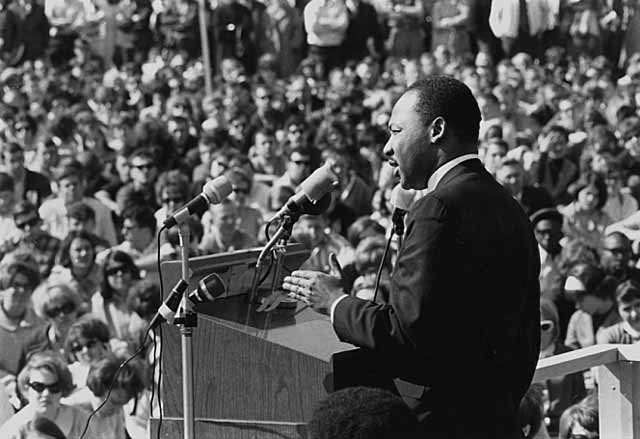What does the College Board have against George Washington and Martin Luther King Jr? Although these men are two of America’s greatest heroes, the College Board’s “redesigned” Advanced Placement U. S. History (APUSH) Framework shoves them aside. Washington’s contribution is limited to a sentence fragment referencing his Farewell Address. King fares even worse—the Framework completely omits the nation’s greatest civil rights leader.
The College Board has offered a variety of excuses to explain these omissions in its course for half a million of the country’s brightest high school students. Apologists claim teachers are of course free to teach Washington, King, and any other American heroes the Framework has. That is true. But the Framework also categorically states, “Beginning with the May 2015 AP U.S. History Exam, no AP U.S. History Exam questions will require students to know historical content that falls outside this concept outline”. The conclusion is obvious: what isn’t tested won’t be taught.
So why did the College Board reduce Washington’s contribution to a single speech and entirely omit King? The real answers to this question go directly to the heart of the College Board’s true agenda and why it must be stopped.
Farewell, George Washington
George Washington was truly America’s indispensable patriot and statesman. He commanded the Continental Army, presided over the Constitutional Convention, and launched our ship of state by serving as America’s first president. Washington’s contemporaries recognized his signal contributions. For one, Virginia Gov. Henry Lee spoke for a grateful nation by eulogizing Washington as “first in war, first in peace, and first in the hearts of his countrymen.”
Unfortunately, Washington was not first in the minds of the College Board authors who wrote the Framework. They relegated the father of our country to this single sentence: “Although George Washington’s Farewell Address warned about the dangers of diverse political parties and permanent foreign alliances, European conflict and tensions with Britain and France fueled increasingly bitter partisan debates throughout the 1790’s.” (To put this treatment of Washington into perspective, imagine how South Africans would respond if an unelected agency issued a history of their country containing just one reference to Nelson Mandela.)
Why did the Framework authors ignore Washington’s enormous contributions to our country and instead focus upon his Farewell Address? The answer is suggested in a recent article by Stanley Kurtz, who establishes a clear link between the Framework’s authors and radical history professor Thomas Bender. Bender considers American exceptionalism a “gross oversimplification” and calls for a new international or global perspective on American history.
From Bender’s global perspective, Washington’s Farewell Address unfortunately influenced America to act according to its own interests, shunning foreign alliances such as the League of Nations. This point of view is evident from the College Board’s sample APUSH exam, which can grant high-scorers college credit. It uses an excerpt from Washington’s Farewell Address as a “stimulus” to launch four multiple-choice questions. Question 31 asks students to conclude that Washington’s Farewell Address “strongly influenced” America’s “refusal to join the League of Nations in 1919.” Question 33 asks students to complete this open-ended statement: “Most historians would argue that the recommendations of Washington’s address ceased to have a significant influence on United States foreign policy as a result of…” The answer is “involvement in the Second World War.”
It appears the Framework authors and exam writers did not select the Farewell Address to highlight one of Washington’s achievements. Instead, they chose it to illustrate the dangers of a foreign policy based solely on national interests. From the authors’ global perspective, the Farewell Address led to America’s disastrous refusal to join the League of Nations and was finally disavowed by America’s involvement in the Second World War and new commitment to a role in global affairs.
Dreaming Away Martin Luther King Jr
The Civil Rights movement dominated American domestic events during most of the time period covered by the Framework’s 1945-to-1980 unit. Inspired by King, black and white activists formed a “coalition of conscience” to press for an end to Jim Crow segregation laws. Astonishingly, the Framework fails to mention Rosa Parks and the Montgomery bus boycott, President Eisenhower and the Little Rock school crisis, and President Kennedy and the Birmingham demonstrations. Even more astonishingly, the Framework authors omit King and his role in these historic events.
Why did they omit King? Perhaps because his famous “Dream” was, as he eloquently explained, “deeply rooted in the American dream,” which is in turn firmly anchored in the inspiring set of ideals embodied in American exceptionalism.
The College Board disclaims political intent, insisting the Framework provides a “balanced” guide that merely helps streamline its U.S. History course. In reality, its authors have embraced a “transnational” perspective antithetical to the idea of American exceptionalism. The omission of King and his “I Have a Dream” speech fits into a broader pattern of scrubbing out any trace of American exceptionalism.
Revoke the Framework
The APUSH Framework has ignited a storm of protests. Outraged citizens, bloggers, commentators, and historians have all criticized the Framework’s biased treatment of American history. The Republican National Committee has unanimously passed a resolution demanding the College Board rescind the new Framework and restore its previous Topic Outline.
The College Board has thus far refused to meaningfully address these concerns. It cannot be allowed to force a politicized course into American classrooms. If the College Board is permitted to remain above the will of the people, it will become the de facto central authority of American education.
Image by Minnesota Historical Society.





